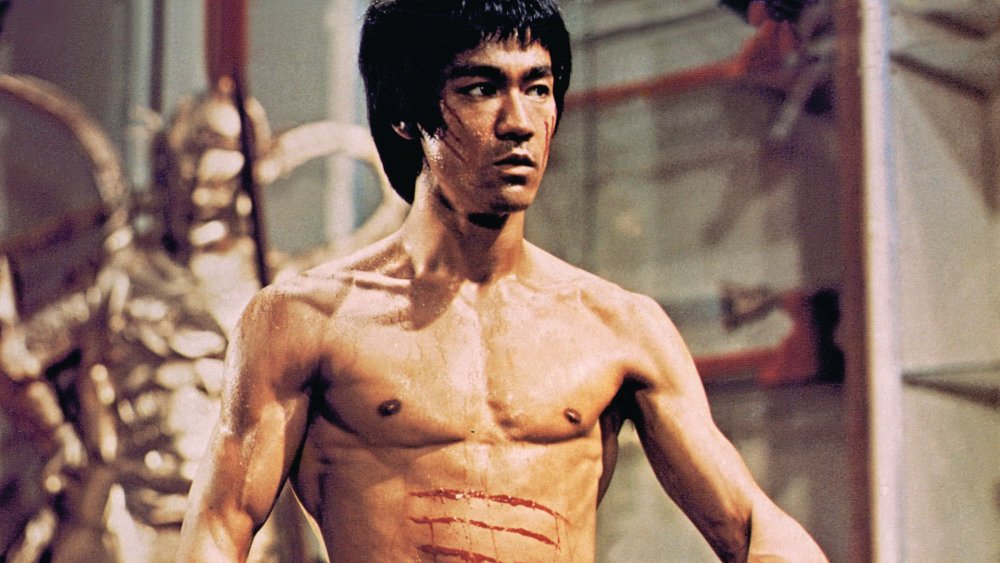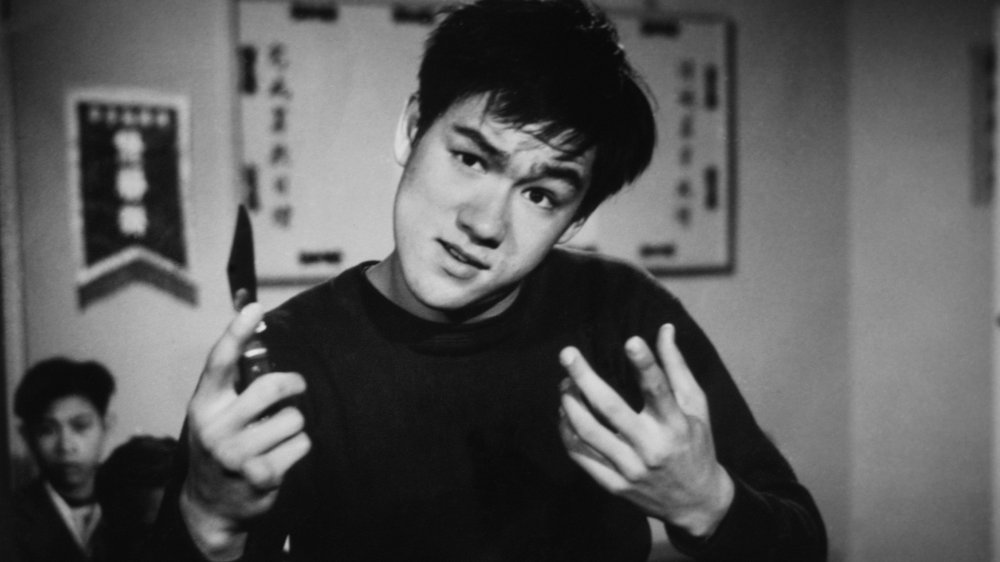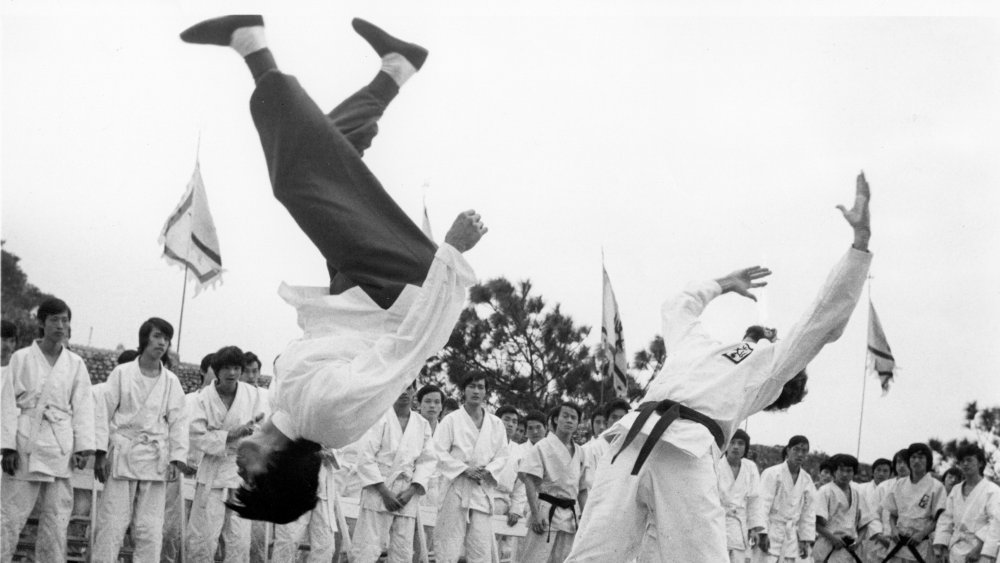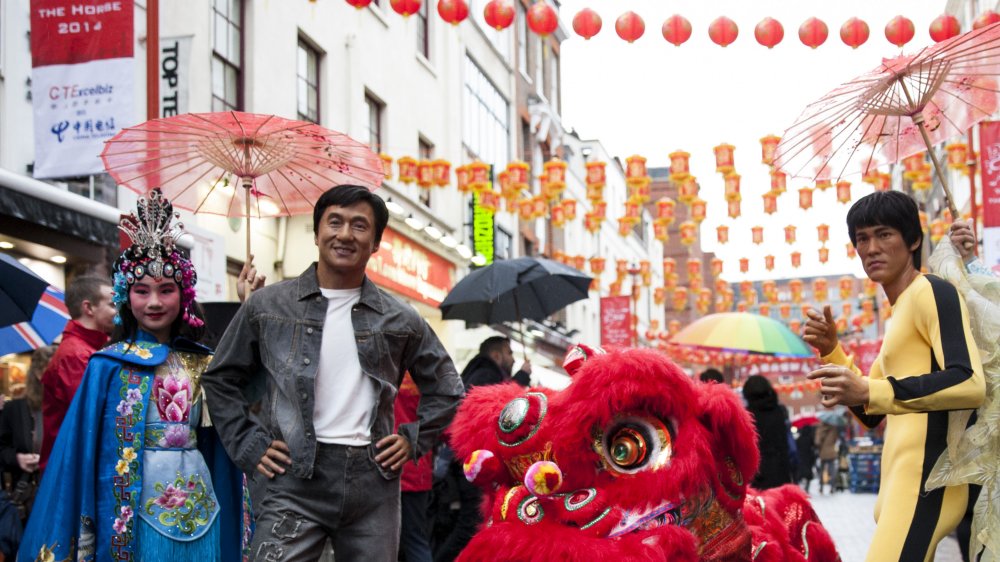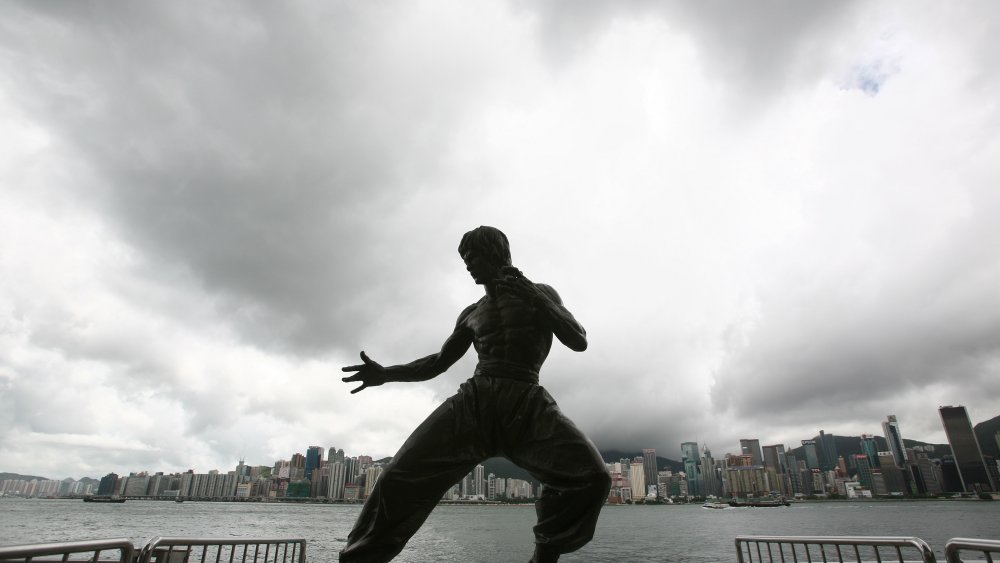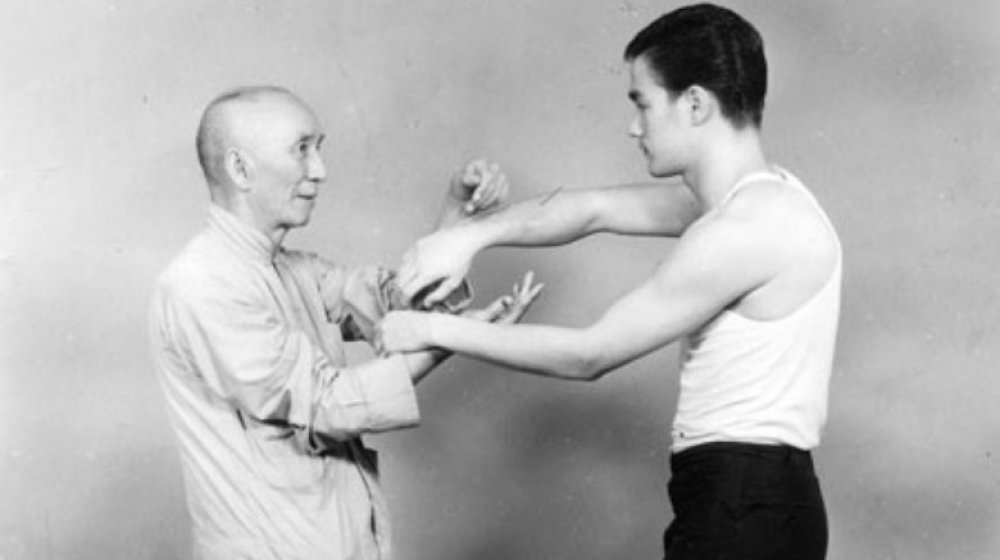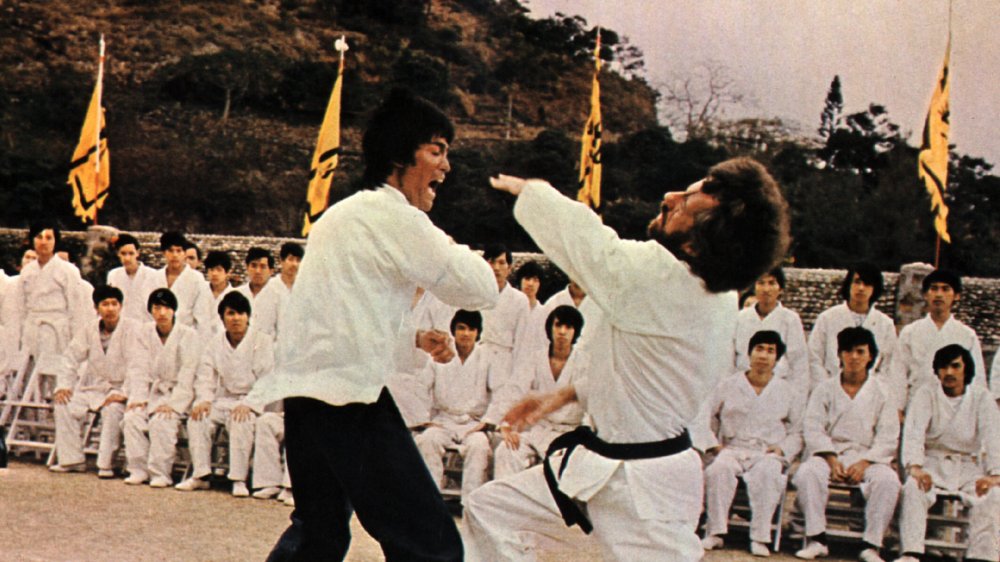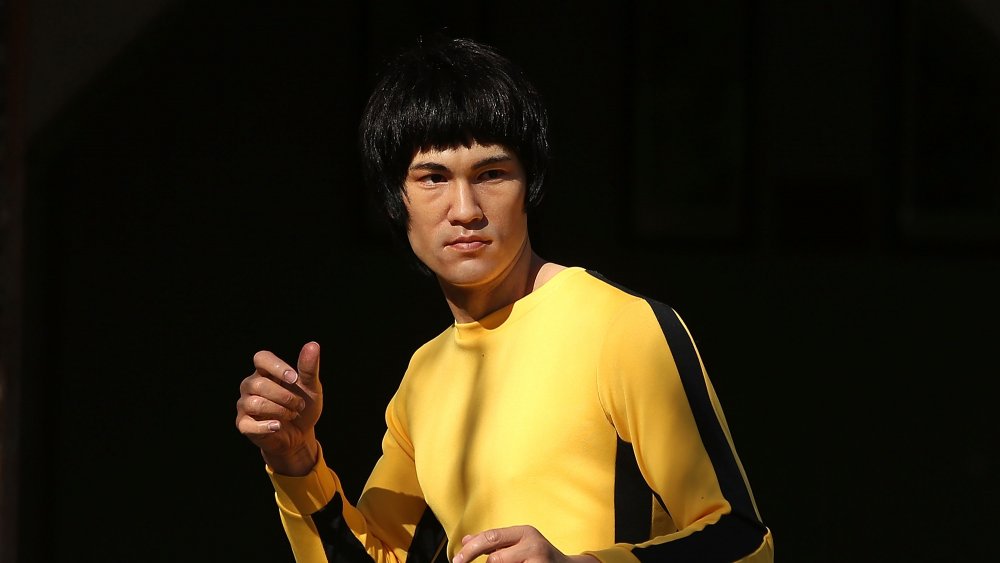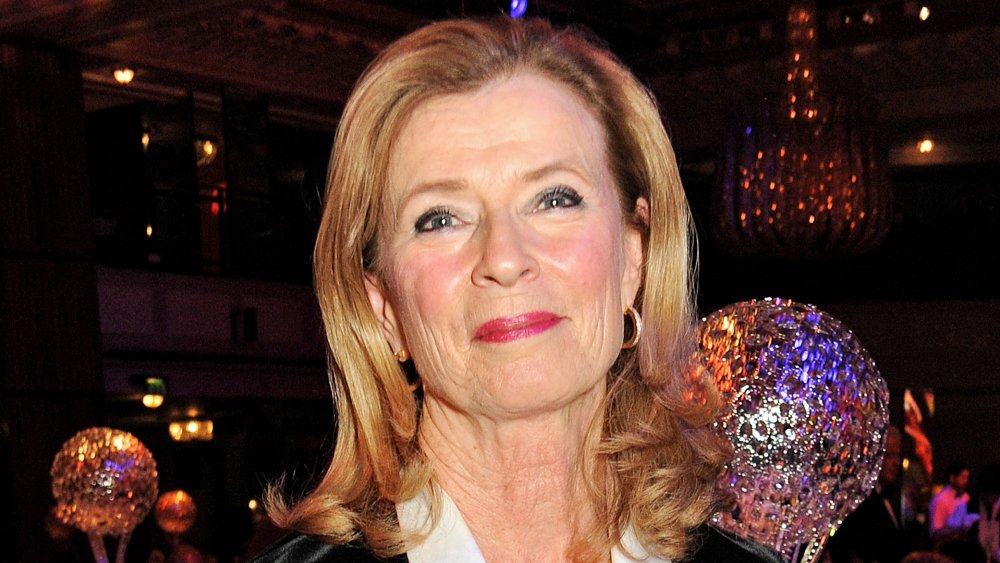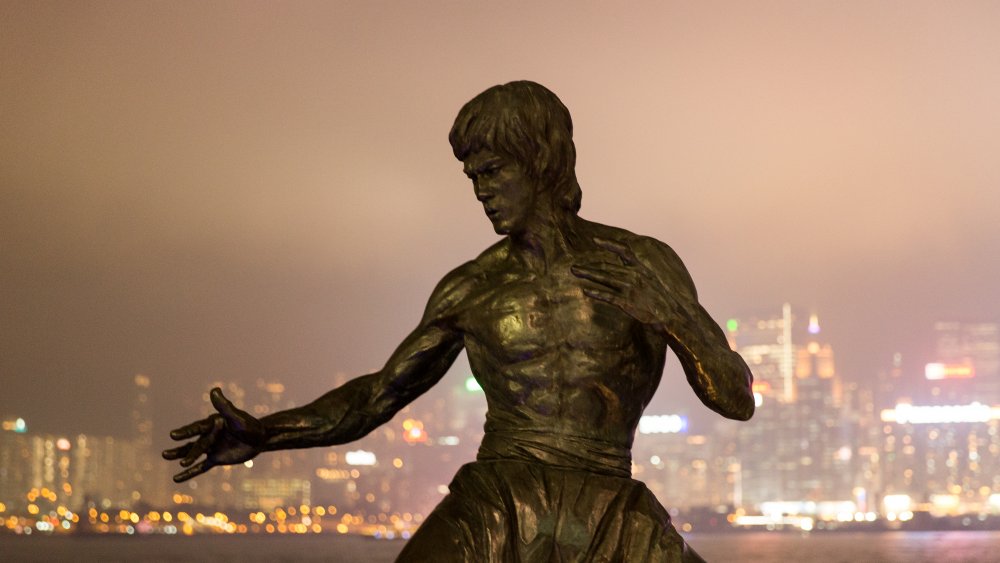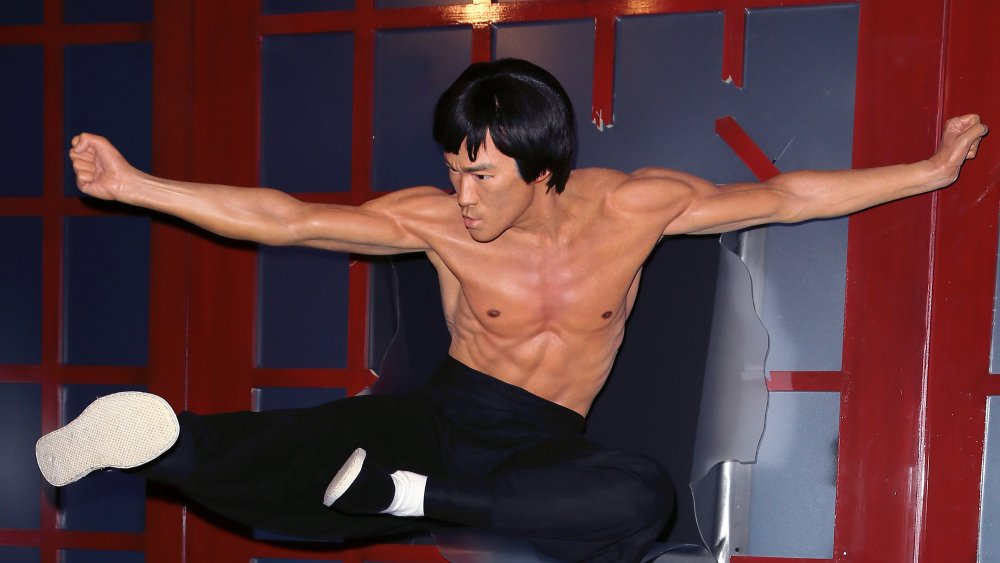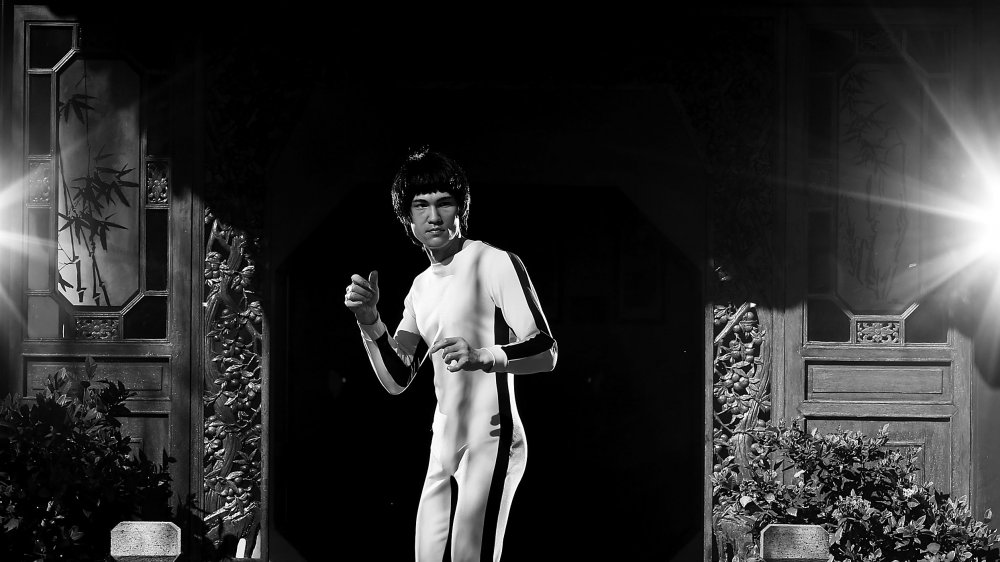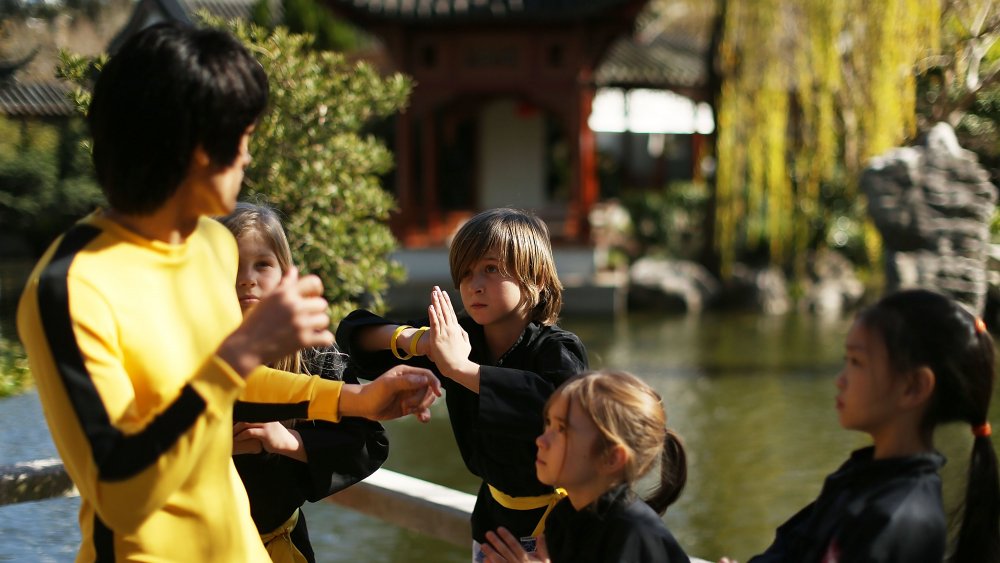What The Last 12 Months Of Bruce Lee's Life Were Like
Bruce Lee, whose birth name was Lee Jun-fan, was a martial arts phenomenon and actor who took the world by storm in the 1970s. Armed with extraordinary fighting abilities and an indomitable spirit, the trailblazer was enthusiastic about embracing new challenges, whether big or small. The martial arts style Jeet Kune Do was his brainchild, and its core philosophy lay in the idea of simplicity and practicality in combat, rather than rigid, formalized technique. He was convinced that many other styles of fighting were too restrictive, and it was necessary to come up with something that was more flexible and less reliant on rules.
Despite being restricted to his bed for six long months after sustaining a back injury in 1970, the fighter didn't give up, working on a book on Jeet Kune Do and his thoughts on his chosen art. While he passed away before he could finish the Tao of Jeet June Do, his close aides, including his wife Linda Lee Cadwell, went ahead and finished the book, which saw posthumous release in 1975. Bruce Lee was an enigma, and when he suddenly passed away in 1973, he left behind plenty of unanswered questions. Here's a look into the life and times of one of history's most promising martial artists.
Bruce Lee was working on films
In the early 1970s, Bruce Lee was occupied with several film projects. He was at a point in his career when he was consciously trying to make a name for himself in Hollywood, a space that had often felt elusive to him. According to Newsweek, Bruce was no stranger to acting in general and had started appearing in Hong Kong films as a kid. It also helped that his dad was an established opera celebrity and an actor.
He first acted in an American TV show, The Green Hornet, in 1966. Lauding Bruce's performance, a film critic commented, "Every kid, I believe, in America noticed that guy behind The Green Hornet — the one who could kick, the one who could punch, the one who could move so amazingly — all eyes centered on him. The makers of The Green Hornet had to actively restrain Bruce Lee from being himself because they realized every time they saw the rushes that everything else was wiped off-screen." Bruce wanted to be taken more seriously and not be reduced to a caricature. He worked on several films to make that happen, including The Big Boss, Fist of Fury, and the highly successful The Way of the Dragon. The movies got plenty of attention and turned the spotlight on Bruce and his promising on-screen persona. He was soon caught up with a few projects including Enter the Dragon, a movie that was released mere days after his sudden death in July 1973.
Bruce Lee was only getting started with his career goals
Bruce Lee was nowhere close to where he wanted to be. He was an achiever and envisioned greater successes for himself. While he was just getting started in mainstream cinema, he was also cultivating his personal brand in a bid to reach out to more audiences globally. He was, of course, also considered a martial arts expert, but he was looking for ways to expand his reach and influence, especially in relation to popular culture. He was still mostly anonymous in the U.S. and only really gained fame after Enter the Dragon made its way to international cinemas after his death.
Author Matthew Polly, who wrote Bruce Lee: A Life in a bid to offer readers and fans a deep dive into Bruce's journey, believed that Lee was just getting started on his path to becoming a household name. According to CNN, Bruce had several projects up his sleeve, including an animated show, a clothing line, and offers from film studios. He was also set to make an appearance on The Tonight Show with Johnny Carson. "He knew he was going to be a superstar, and he was getting ready for it," Polly said.
Bruce Lee inspired Jackie Chan (and hit him in the face)
Martial artist Jackie Chan was at the beginning of his professional journey in the 1970s and got a chance to work with Bruce Lee. Their first film together, Fist of Fury, gave Chan a glimpse into Bruce's way of doing things. Chan found him incredibly inspiring to work with. According to the South China Morning Post, Bruce was insistent on treating all staff on set, including stuntmen, as equals — something that stayed with Chan long after work on the movie was completed. Bruce would often have his meals with the stuntmen and engage them in conversation. He was proactive and always willing to help out with things like footing someone's medical expenses. "He influenced me a lot," Chan stated in 1997. "I admired him, and the way he would talk. He could even speak English. Everyone thought he was a god."
While filming a fight scene for Enter the Dragon, Bruce unintentionally whacked Chan in the face with a stick. Chan reflected on the incident later and described Bruce's reaction. "As soon as the director shouted cut, he threw the sticks down and rushed to me," Chan said. "I was used to getting hit. I got hit every day as a stunt guy — I got punched, I got kicked. But when I saw him [Bruce] running towards me, I pretended [I was hurt]."
Bruce Lee was trying to carve out his individual identity
Bruce Lee found himself at a crossroads in the final year of his life. Even though he was reasonably successful and was on his way to becoming world-famous, he wished to be known for the man he actually was — and shatter records while he was at it. According to The Ringer, His 1972 movie Way of the Dragon did manage to gain popularity for Bruce's brawl with Chuck Norris and broke box office records. Additionally, it was the first Hong Kong production to be filmed in the West. However, he was still struggling to make an indelible mark in the West and to secure his individual identity as a martial arts genius, actor, and entertainer.
While Lee didn't see international fame during his life, his individual identity gained cult-like status after Enter the Dragon. Matthew Polly commented on this, saying, "I think when someone becomes an icon, they become some sort of essential characteristic of a human being, instead of a human being itself. Bruce Lee became the icon of the 'driven badass' who's almost invincible — he became the God of War. In that sense, he's a lot like Batman or Superman, and not like James Dean or some other actor."
Bruce Lee faced criticism for missing Ip Man's funeral
Bruce Lee did have a dark side: He was notoriously difficult when it came to creative projects. "There tends to be three versions of Bruce Lee told," Matthew Polly said in an interview with The Ringer. "One is what we call 'Saint Bruce,' the hagiographic version in which he is something of a demigod. The second one is kind of the humanistic portrait, focusing on his successes but his flaws." He added that the third kind basically hinged on the belief that Bruce could be a jerk when he wanted to be. For instance, Bruce got Wu Chia-Hsiang replaced as director for The Big Boss. The logic was simple: if Bruce wasn't fond of someone, he wouldn't hesitate to get them replaced.
Another story that stood out was from 1972. When his Wing Chun master, Ip Man, passed away in December, Bruce failed to show up to the funeral. He was called out by news outlets in Hong Kong for giving the ceremony a miss. "As the founder of Jeet Kune Do and a big movie star, perhaps it was just too inconvenient," one of Ip's students commented back then. Another teacher who'd worked with Bruce said, "This was definitely a breach in terms of the decorum of the martial arts world. People shouldn't forget their 'roots.'" It was only revealed later by Matthew Polly in Bruce: A Life that the star wasn't even informed about his teacher's passing.
Enter The Dragon ran into difficulties during filming
When filming began for Enter the Dragon, the crew had to be flexible with Bruce Lee's demands. For instance, he wanted screenwriter Michael Allin to be fired. According to the South China Morning Post, Bruce was of the opinion that the film's story didn't represent his Chinese roots accurately and wanted to avoid bias. However, the tweaks he suggested to the story were dismissed, so he requested that Allin be replaced.
Additionally, the movie had a fixed budget of $500,000, which was abysmally low, so the crew and the producers had to make do by compromising. Moreover, while some crew members were from Hong Kong, while others were from the U.S., a fact that caused conflict when work first began on the film. Bruce was aware that this movie was a significant milestone for his career and wanted things to align with his vision, something that didn't go down too well with the producers.
Robert Cohen, who attended the premiere of the film and later made Dragon: The Bruce Lee Story, said, "I was at the American premiere of Enter the Dragon at Grauman's Chinese Theatre. [...] The audience looked like they had emptied all the jails. It was the most street audience I had ever seen. This guy came on the screen, this very handsome Chinese guy who could do all this amazing stuff, and people were screaming and cheering like it was a live sporting event."
Bruce Lee stayed focused on fitness
Bruce Lee was, on account of his work and fitness regime, a fanatic and looked after his health. He was reported to have abstained from stimulants like coffee, alcohol, and tobacco as much as possible during the last year of his life. Speculations were especially rife about his health after his unexpected demise at a young age. However, by all accounts, he was healthy and focused on fitness.
According to Entertainment Weekly, Bruce once famously said in an interview with Fighting Stars magazine that he wasn't fond of alcohol at Hollywood gatherings. "I'm not that type of cat. I don't drink or smoke and those events are many times senseless," Bruce said. His friends would reveal that he suffered physical reactions after partaking in booze, including nausea, excessive sweating, and turning red. In other words, Bruce exhibited the alcohol flush reaction and couldn't tolerate most drinks.
It's also worth noting that Bruce exercised diligently and made sure he worked on his strength as well as conditioning. He had a bit of everything in his regime: boxing, running, jumping rope. and weight lifting. He was also a huge fan of protein drinks and health supplements. Lee was extra conscious about his physique because he needed to maintain it to make it big in cinema.
Bruce Lee was allegedly cheating on his wife
The fact that Bruce Lee wasn't entirely faithful to his wife was hardly a secret. He was known to have indulged several affairs in the course of his marriage with Linda Lee Cadwell. Per Matthew Polly, Bruce was quite the playboy and was involved with many women, including actress Sharon Farrell, who candidly revealed that, "[Bruce] took me to the moon and back. [...] He was the first man I had ever been with who had such a beautiful body. Those abs — his muscles were so defined, it was as if they were chiseled. Bruce was the most incredible lover I've ever been with. He was just so knowledgeable about a woman's body."
On the day of his death, Bruce was with one of his lovers, actress Betty Ting, a fact that didn't go unnoticed by the public and the media. However, his wife defended him in a letter published by the Los Angeles Times in 1998, a rebuttal to an article by Alison Dakota Gee titled "Dragon Days." She wrote, "I was personally offended by Alison Dakota Gee's article about my late husband, Bruce Lee." She added that he'd not died from too much aspirin, as the article claimed, and that being Bruce's wife, she was qualified to issue clarifications. She also said that she'd heard plenty of extramarital gossip about Bruce but that it was all gossip.
Bruce Lee was unwell a few days before he died
It is worth noting that several reports, including one by Newsweek, indicated that Bruce Lee became ill about two months before he died. He suffered from headaches and seizures and was even taken to a hospital after passing out. Bruce was diagnosed with cerebral edema (swelling) and was unconscious for a whole day. Afterward, he flew to the UCLA Medical Center for testing.
Polly's book, Bruce Lee: A Life, later revealed that doctors had concluded that Bruce had experienced a grand mal seizure. However, they weren't sure about the cause and discharged him when he seemed better. His swelling had disappeared. On the surface, Bruce appeared healthy, and no one was expecting anything out of the ordinary to happen. He even went to Hong Kong for a long visit — this turned out to be his last excursion to his homeland before his untimely demise.
Bruce Lee was working on his final day
Bruce Lee was geared up for a productive day on July 20, 1973, mostly involving work on his upcoming film, The Game of Death. According to The Ringer, he also wrote to his attorney about his pending business deals.
Bruce had a lot of plans in terms of work and was pumped to see them executed. After writing the letter, Bruce left for Golden Harvest's studios and spoke to actor George Lazenby and film producer Andre Morgan to brainstorm for The Game of Death. He met Chow after this session and told him that he wanted Lazenby to be a part of the film. After this meeting, he swung by Morgan's office to discuss logistics before visiting the apartment of his alleged lover, Taiwanese actress Betty Ting.
Chow joined them in the evening. He later recalled, "Bruce wasn't feeling very well. I wasn't feeling very well either. I think we had some water, and then he was acting." Bruce was excited and acted out several Game of Death scenes during his discussion with Chow. Later, the martial arts star complained that he had a headache. He took a painkiller and went to Betty's bedroom to rest. At around 9:30 PM, Betty went to check on Bruce and noted that he was unresponsive, calling Chow in a state of panic. When Chow returned to the apartment, he realized that Bruce was gone.
Bruce Lee's death remained mysterious for years
Bruce Lee's fans were heartbroken when news broke that the martial arts expert had died unexpectedly at the age of 32. Rumors spread like wildfire, and reporters were initially lied to in order to avoid controversy, especially considering the fact that he had died in Ting's home. According to Newsweek, Bruce's death was attributed to cerebral edema. However, what caused the edema was unclear.
An autopsy that was conducted at Queen Elizabeth Hospital in Hong Kong identified the edema but couldn't pinpoint the reason for Bruce's condition. Bruce had taken hash during the day, and lots of people assumed that the incident was triggered by his consumption of the drug. "We gave Bruce a long talk before he was discharged from hospital, asking him not to eat hashish again," Dr. Peter Wu, one of the doctors who treated him after his earlier collapse, was quoted as saying in the 2000 book The Tao of Bruce Lee. "We told him that his very low percentage of body fat could make him vulnerable to drugs."
Other theories range from blaming the painkiller Bruce was given at Ting's place to positing that he was struck down by a curse. Many initially speculated that the death was a ruse and simply a promotional tool for The Game of Death. Scientists speculated in 2006 that Bruce could have had an epileptic seizure. Matthew Polly suggested another idea: heatstroke, something that could have been avoided.
Bruce Lee left behind a solid legacy
What has made Bruce Lee relevant after all these years is the fact that he was an enigmatic superstar who died far too young. He has since achieved much posthumous recognition in the West. During his lifetime, Bruce did manage to solidify his legacy by setting the way forward for Asian artists in Hollywood. His unique interpretation of martial arts earned him major props.
Many fans embraced martial arts after learning about Bruce. "No other celebrity changed people's lives in that way," Matthew Polly said to CNN. "Nobody watched a Steve McQueen movie and took up something. People study martial arts because of Lee, and it changed their lives for the better. Bruce Lee has a place in a lot of fans' hearts as a demigod, or what I call a patron saint of kung fu. He had a missionary effect."
Film director Justin Lin told The Ringer that he feels connected to Bruce Lee and his legacy. "Anything that we can do to share that with people that are coming after us, I feel like that's part of identity, and part of our journey just as a shared experience as a community — whether that's being Asian American, whether that's MMA, whether it's movies," he said. "By now, it's been almost 50 years, so it's a fact: [Bruce Lee] is timeless."
